
Presentations on Demand
Watch these one-hour presentations anytime, anywhere, on topics such as writing, editing, contracts, royalties, taxes, copyright, time management and more, presented by a variety of industry experts. Members: Log in to access. Non-Members: Join TAA today and receive access to all of TAA's 250+ presentations on demand for one full year.
Browse presentations by topic below:
Textbook Writing | Textbook Publishing | Contracts & Royalties | Taxes | Copyright | Marketing | Supplements | Indexing | Ebooks, Open Access & Self-Publishing | Textbook Proposals | Visuals and Illustrations | Artificial Intelligence & Authoring
Academic Writing | Academic Publishing | Academic Editing | Academic Books | Grant Writing | Time Management & Productivity | Social Media for Academics | Tenure & Promotion | Dissertation Writing | Visuals and Illustrations | Artificial Intelligence & Authoring
TAA Conference Sessions On Demand
2022 TAA Conference | 2021 TAA Conference | 2020 Summer Webinar Series | 2019 TAA Conference
2018 TAA Conference
Recent Presentations
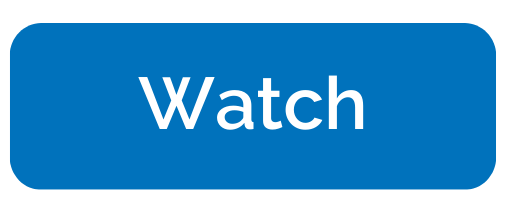
Presenter: Dr. Erica Machulak, Founder, Hikma
Marketing doesn’t need to be flashy to be effective. The best marketing plan for your book will build on your strengths, move your work forward, and foster connections with your ideal readers and collaborators. Learn how to align your book marketing strategy with your professional goals so that you can sidestep some of the challenges that many academic authors face come publication day. Erica shares stories and learnings from the launch of her new book, Hustles for Humanists: Build a Business with Purpose (Rutgers University Press, 2025). You will take away:
- A framework to situate your work in context
- Three steps toward a low-key book launch
- A brief exercise to jumpstart your book marketing plan
This session is designed for emerging and established authors with book projects at any stage of development.

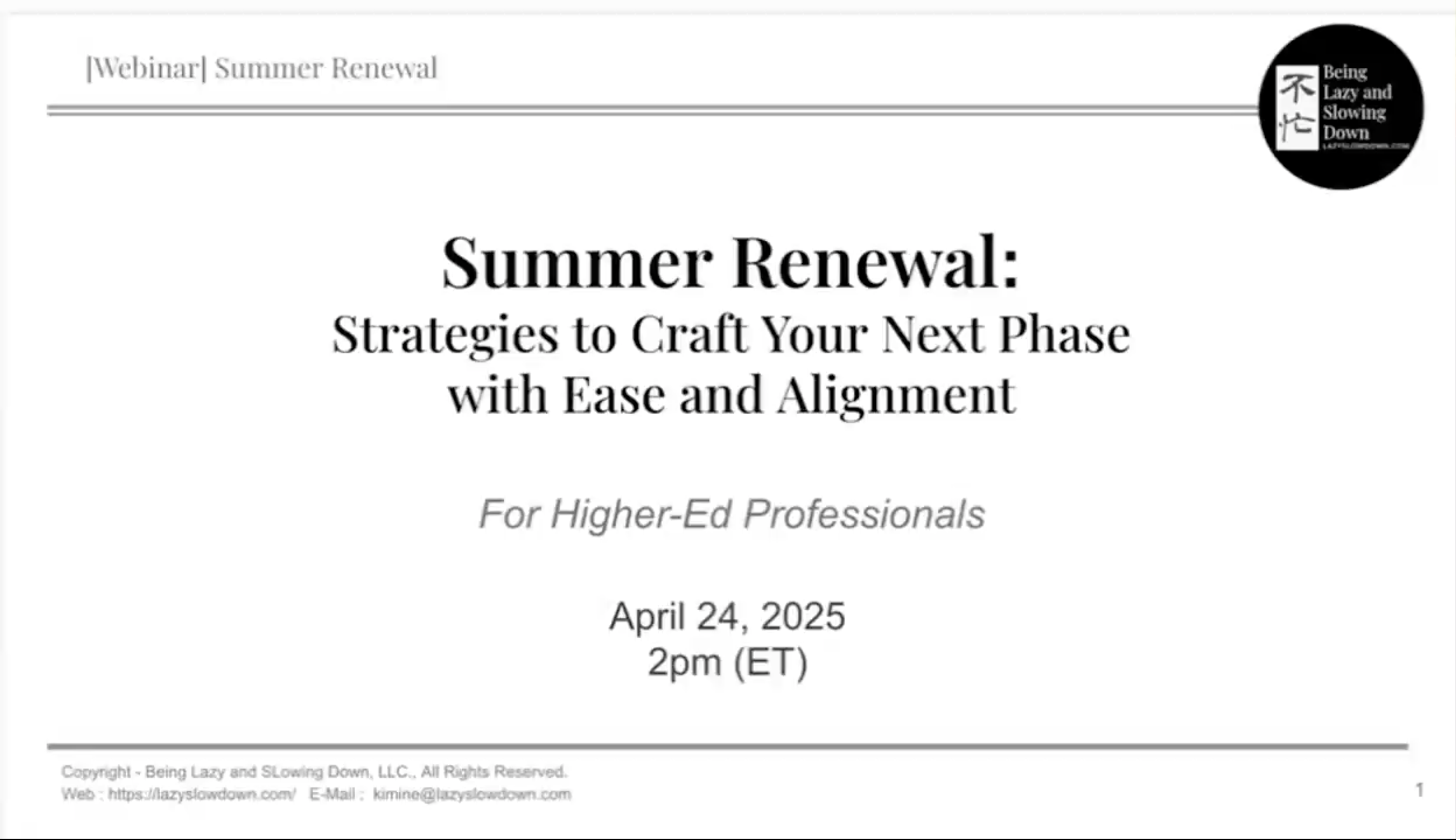
Presenter: Dr. Kimine Mayuzumi, Co-founder, Being Lazy and Slowing Down
This empowering webinar is designed specifically for higher-education professionals including faculty, researchers, and administrators. As another academic year draws to a close, it's time to embark on a journey of renewal.
In this webinar, Kimine delves into practical strategies to navigate burnout, regain clarity, and recharge your professional battery. Whether you're feeling overwhelmed by the current academic landscape and called to make changes in the way you conduct your only life or simply seeking a fresh perspective for the summer months onwards and wanting to realign your path with your vision and goals, this webinar is your opportunity to learn how to pause, reflect, recharge and reset so that you can gain clarity, purpose, and greater ease.
Gain insights, tips, and resources to help you harness your potential by centering your wellbeing. You will learn the guiding light to the next stage of your life, effective keys to pausing, reflecting and resetting, and the four steps to tap into this reflective and renewal journey in detail.

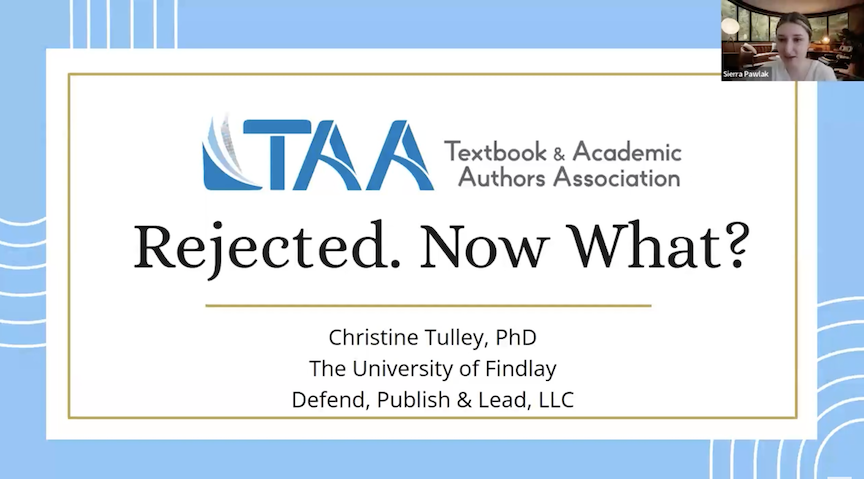
Presenter: Christine Tulley, Professor of English, Founder and Director of the Master of Arts in Rhetoric and Writing, The University of Findlay
Most academics will experience rejection at some point during a scholarly writing career. It may take the form of an outright rejection, requiring the project to be submitted somewhere else, or a revise and resubmit, where substantial revisions might be necessary. In this one-hour webinar, learn a series of strategies for navigating rejection news and effective practices for approaching resubmissions of scholarly projects to increase the likelihood of success.

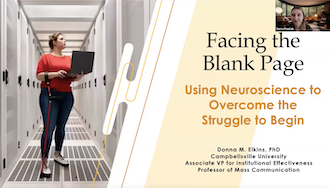 Presenter: Dr. Donna Elkins, Associate Vice President for Institutional Effectiveness and Professor of Mass Communication at Campbellsville University Presenter: Dr. Donna Elkins, Associate Vice President for Institutional Effectiveness and Professor of Mass Communication at Campbellsville University
A challenge that most writers face at one time or another is the blank page and how to begin their work. Though finding the steps to begin might not be easy, there are ways understanding how your brain works can help you jump that first hurtle.
In this interactive session, you will learn ways to organize your work, trick your mind out of facing the blankness of a new page, and allow yourself to make progress even if it is imperfect. You'll also get to practice six strategies to get your brain working for you and not against you as you start a new writing project or pick up an existing one.

Presenter: Wendi Zimmer, Ph.D., researcher, writing consultant, Assistant Professor, Texas A&M University
We know we must see ourselves as writers to reach our publishing potential, but our mindset and limiting beliefs often get in the way. Instead, what if we could shift our mindset to show up differently as writers? What if there was a simple, easy, and transformational system that you could implement today? In this webinar, Wendi Zimmer guides you through research-based strategies that will change how you see yourself as a writer (and any other area where you want to be more successful). These strategies are grounded in principles surrounding your mindset, identity, habits, and energy. Believing in yourself is the concept. Wendi's system is the tool.

Presenter: Christina Inge, Harvard University, and Author of Marketing Analytics: A Comprehensive Guide
Tired of feeling overwhelmed by the endless distractions pulling you away from your writing goals? This refreshing take on productivity tailored for the busy academic. Rediscover your focus and develop actionable strategies to finally finish that manuscript, whether you're working on a textbook, research paper, or academic article. Designed with college professors and researchers in mind, you'll learn proven techniques for overcoming writer’s block, managing time effectively, and staying motivated, so you can confidently bring your work across the finish line.

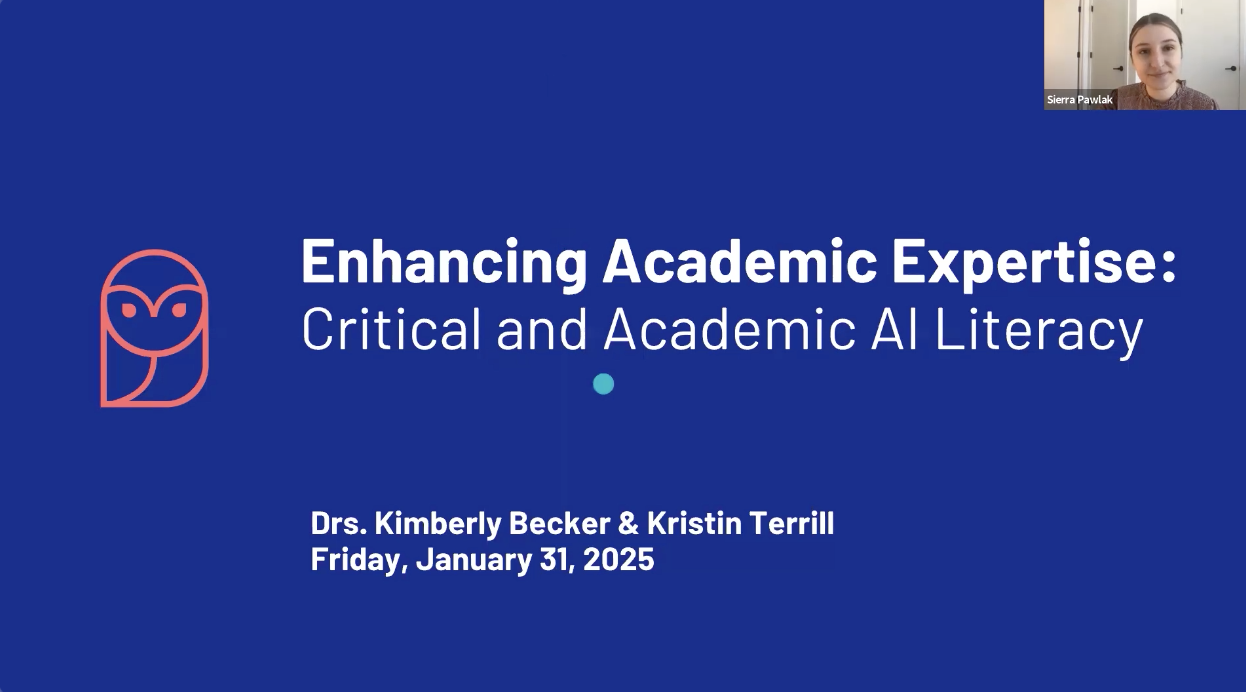 Presenters: Kimberly Becker, co-founder of Moxie; Kristin Terrill, Ph.D. Senior Program Specialist for Graduate Scholarly Activities, Iowa State University Graduate College Presenters: Kimberly Becker, co-founder of Moxie; Kristin Terrill, Ph.D. Senior Program Specialist for Graduate Scholarly Activities, Iowa State University Graduate College
Enhance your understanding of AI's role in academia with this essential webinar on critical and rhetorical (communicative) AI literacy. Explore:
- Foundations of AI literacy: Evaluating AI systems, their biases, and societal impacts
- Rhetorical dimensions of AI: Understanding AI as a communicative tool and its persuasive capabilities
- AI's influence on academic discourse and knowledge production
- Strategies for effectively communicating about and with AI in academic contexts
- Ethical considerations for integrating AI in research and writing processes
This webinar will equip you with the tools to critically assess AI technologies, understand their communicative potential, and navigate their use in academic environments. Learn to leverage AI responsibly while maintaining the integrity of your scholarly work.

Presenter: Dr. Kimine Mayuzumi, Co-founder, Being Lazy and Slowing Down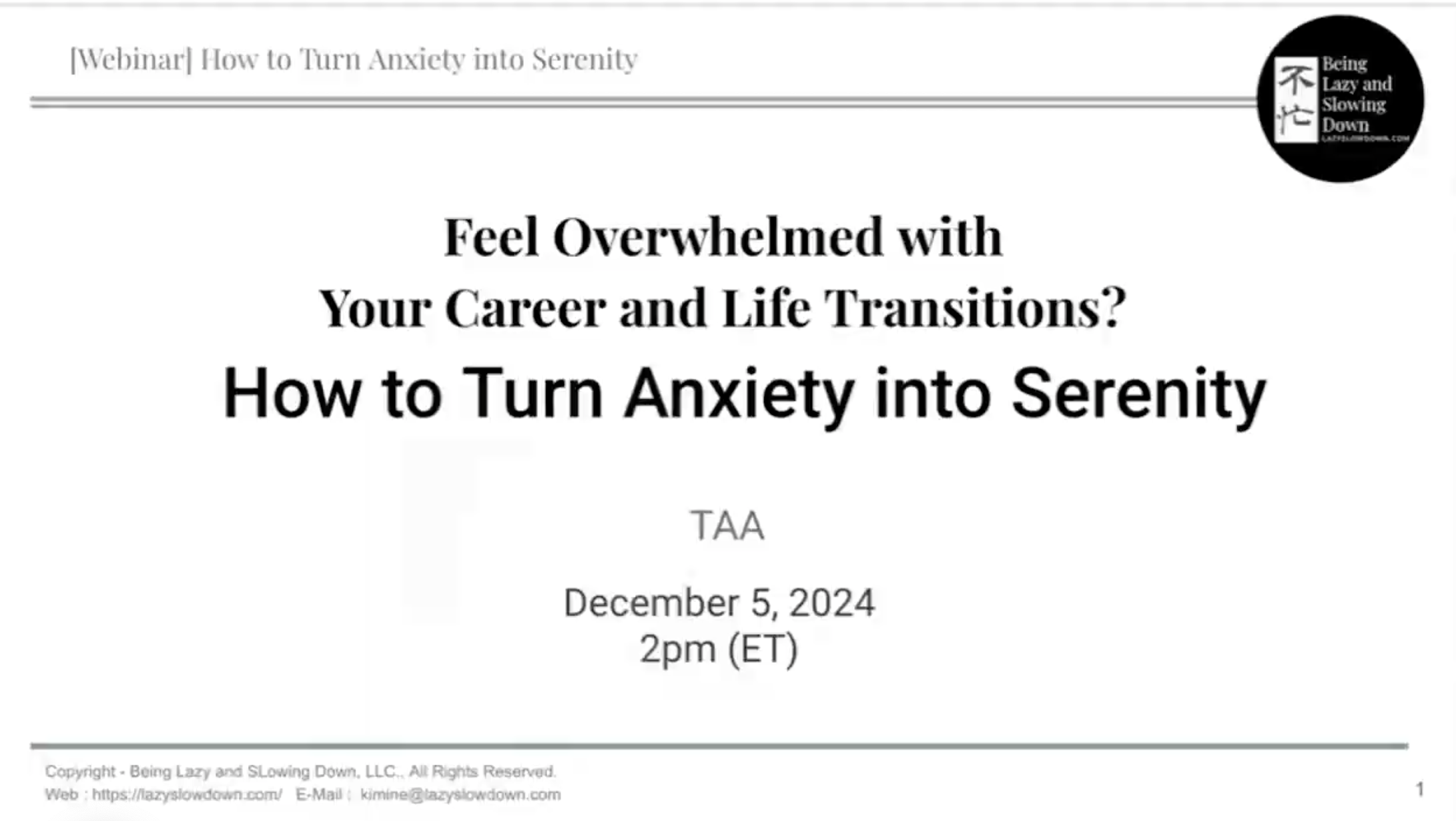
Career and life transitions can be a major source of stress, affecting the wellbeing of many higher-ed professionals. In this one-hour webinar, Dr. Kimine Mayuzumi, co-founder of Being Lazy and Slowing Down, will share practical strategies for navigating these anxiety-laden situations with greater ease.
By the end of the session, you’ll:
- Uncover a powerful framework to center your wellbeing and illuminate your path forward.
- Discover a key tip to help you move forward with more confidence amidst uncertainty.
- Learn how to navigate anxiety during career or life transitions with ease and focus.
Through interactive exercises and an accompanying Resource Sheet, you’ll have the opportunity to reflect on your own circumstances and apply these strategies, empowering you to find grace and serenity in the midst of life’s challenges and reclaim balance in both your professional and personal journey.

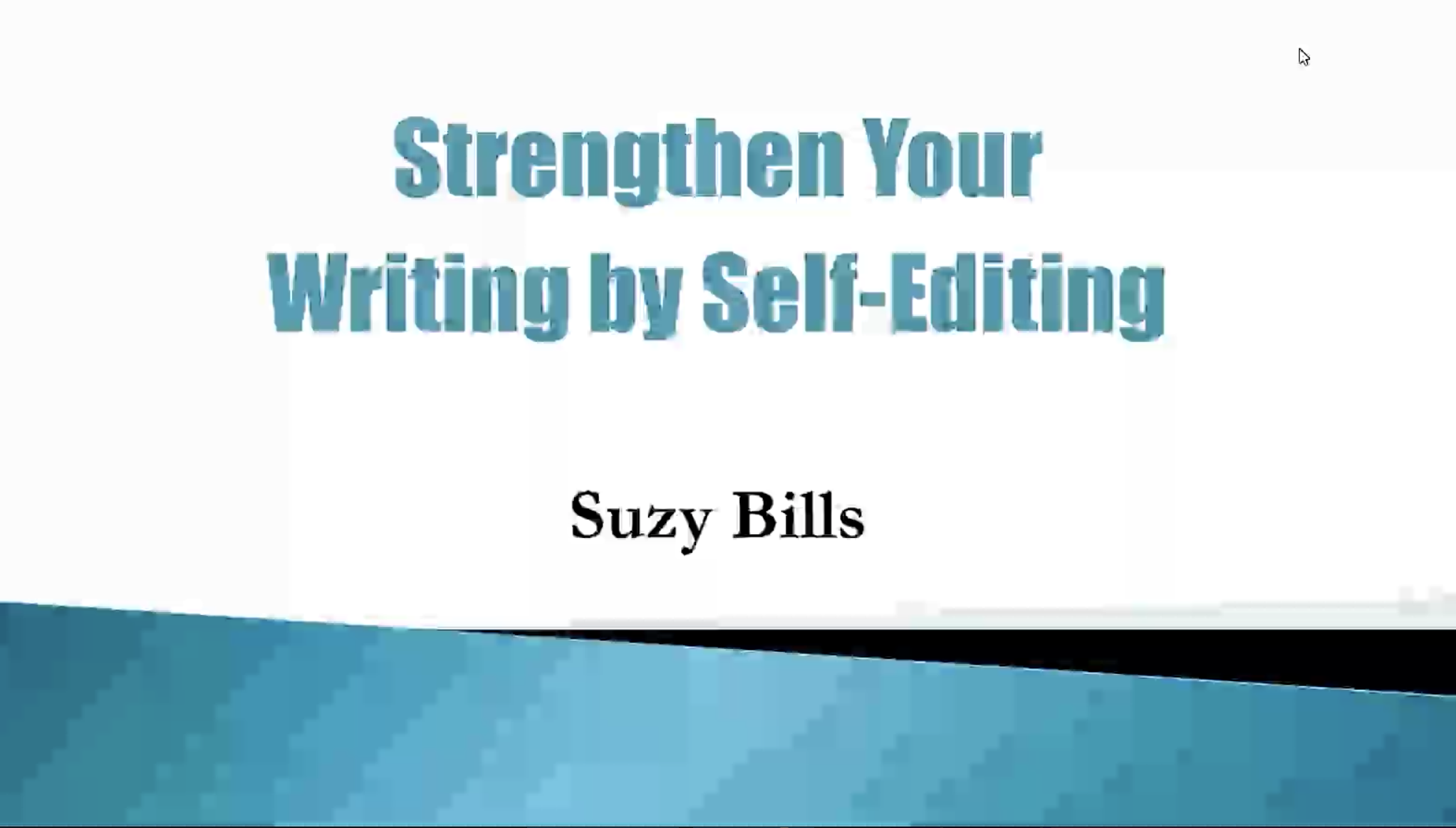 Presenter: Suzy Bills, Editor, Author, Faculty Member, Brigham Young University Presenter: Suzy Bills, Editor, Author, Faculty Member, Brigham Young University
You’ve finally finished your manuscript, and you’re ready to send it on its way. But don’t hit Send or Publish just yet. If you complete some self-editing first, your readers will be better able to focus on your brilliant ideas, not on any grammar, punctuation, and clarity issues in your writing. This one-hour webinar will explain common writing issues and how to fix them. Learn more

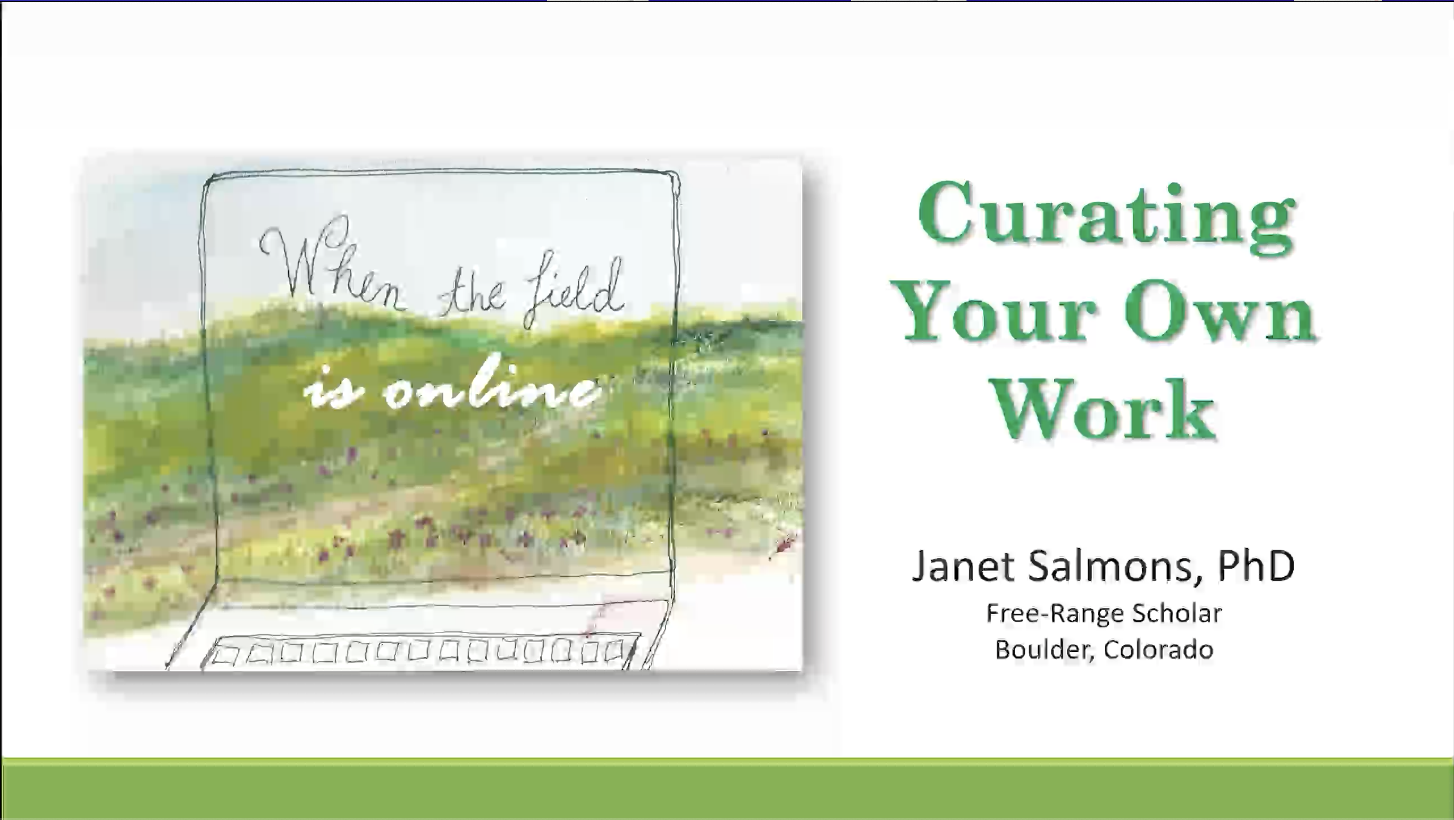 Presenter: Janet Salmons, PhD, free-range scholar, qualitative methodologist, creative Presenter: Janet Salmons, PhD, free-range scholar, qualitative methodologist, creative
You want to contribute to your field, but your work is scattered across multiple publications (and buried on your hard drive.) In this webinar Janet Salmons will show steps in the process she is undertaking as a fellow of the Center for Advanced Internet Studies to curate a largebody of work and transform it into a multimedia e-book. She’ll suggest other curatorial approaches such as citation analysis or autoethnographic reflection on your academic writing journey.
In this webinar you will learn how to organize your work, invite feedback, and create new publications. Develop a plan to make your body of work an important foundation that others can build upon!

Presenter: Christine Tulley, Professor of English, Founder and Director of the Master of Arts in Rhetoric and Writing, The University of Findlay
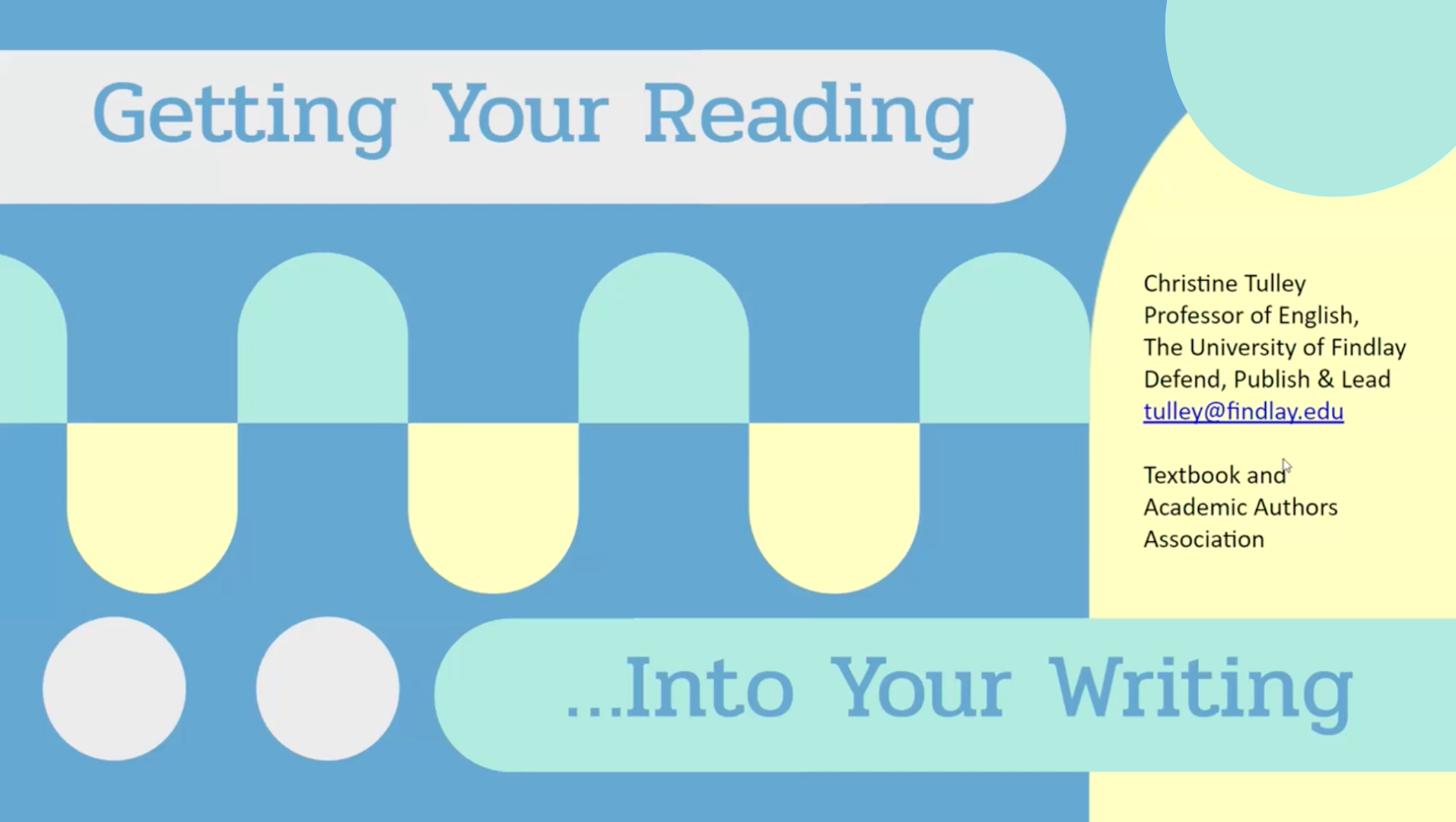
Many scholarly writing projects require engagement and citation of previous literature to situate an argument or purpose. Yet new and experienced academic writers struggle to determine 1) which sources are best suited for the project, 2) how much citation is needed, and 3) how to take notes on sources and move notes on sources into a writing project.
In this webinar you will learn how to systematically cite, analyze, interpret and comment on judiciously selected past scholarly literature to situate your writing project.
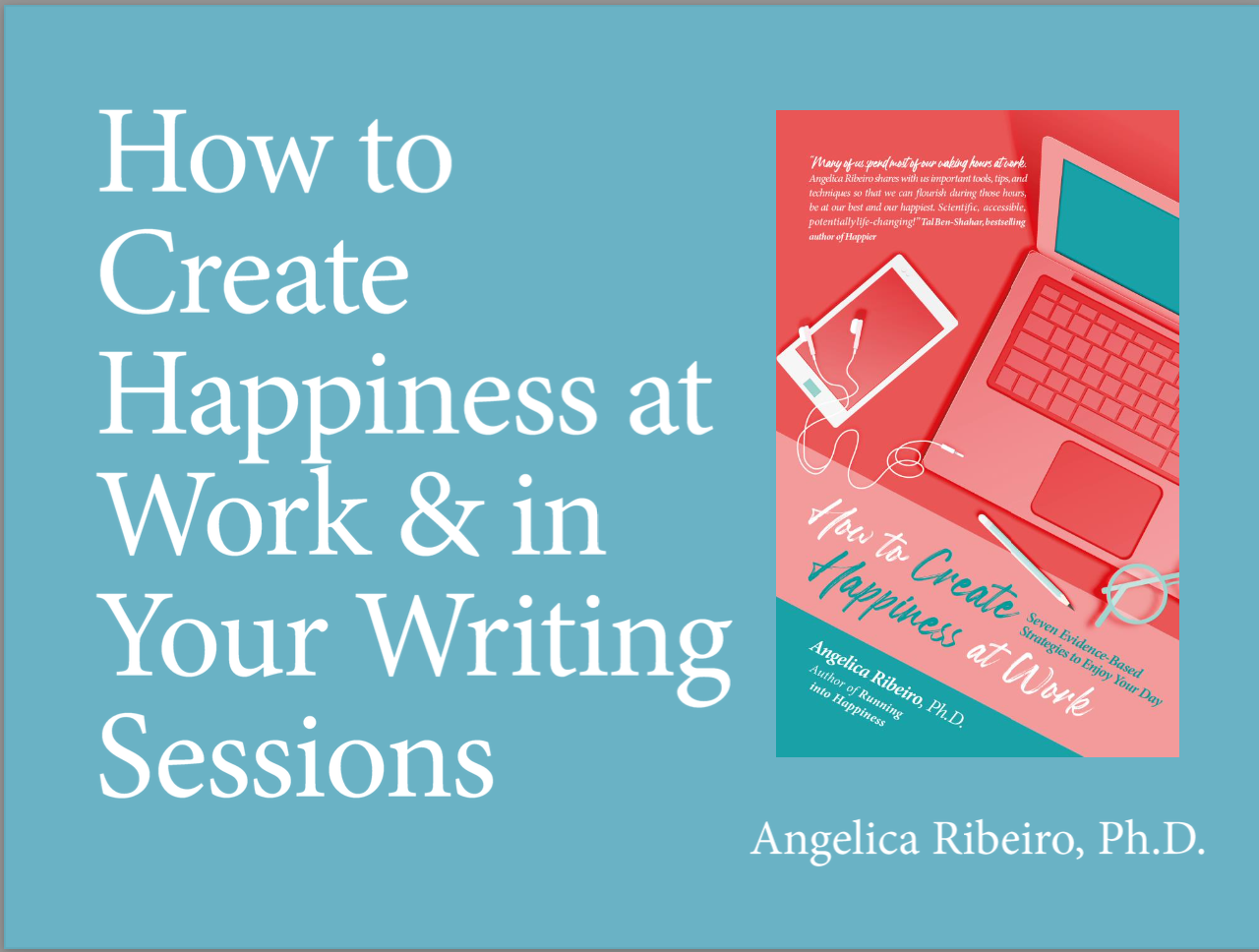

Presenter: Angelica Ribeiro, Ph.D., writer, researcher, professor
If you are like most people, you tend to think that happiness comes after work or after you complete your writing projects. But if you wait until you finish work to be happy, you will spend one-third of your life feeling unhappy.
Being happy at work, including in your writing sessions, makes you more productive, more creative, more optimistic, and better problem solvers, as well as better prepared to face challenges and manage stress.
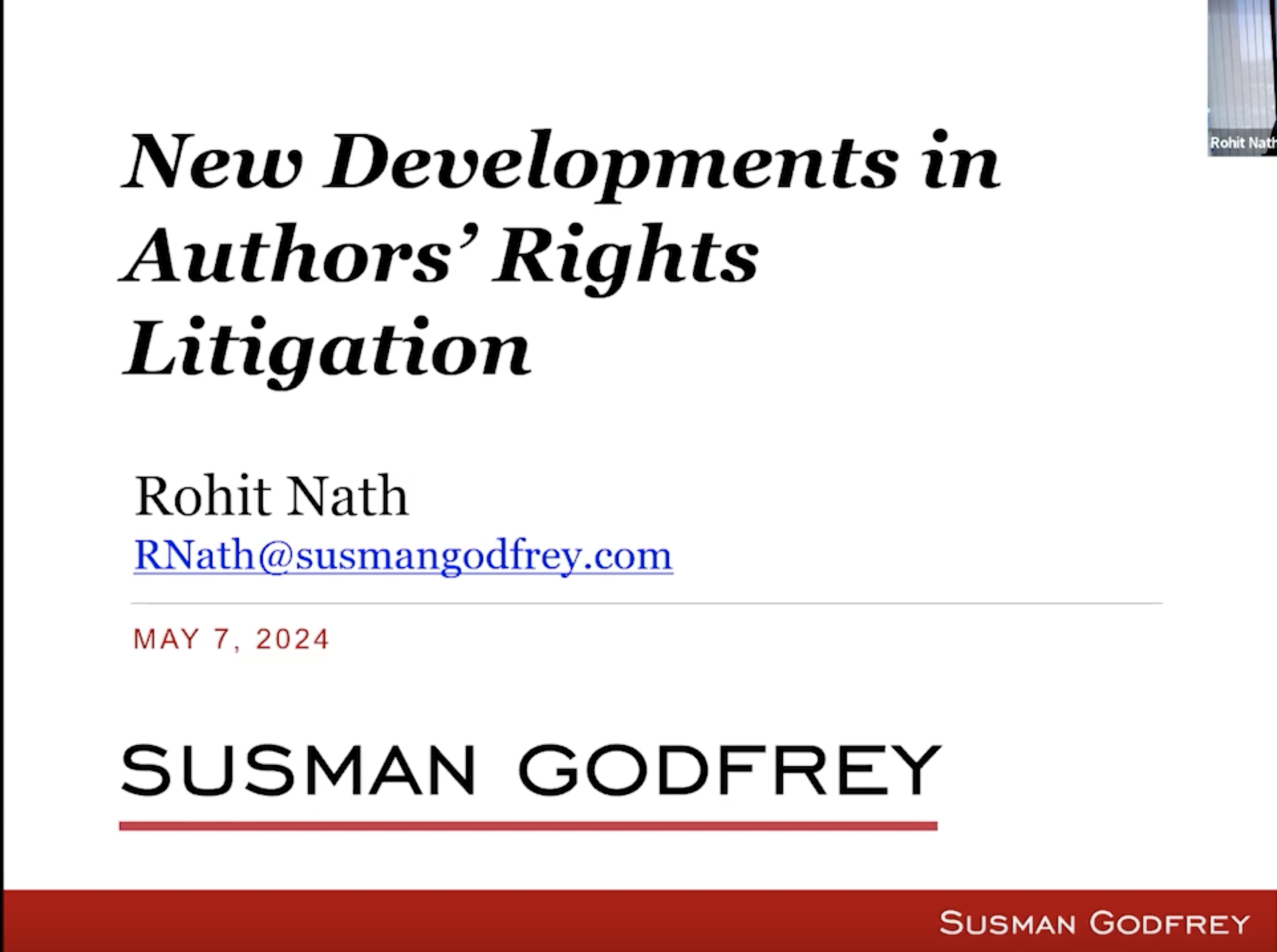

Presenter: Rohit Nath, Partner, Susman Godfrey L.L.P.
Over the last several years, there have been a number of major lawsuits addressing the intersection of technological change and the rights of authors and creators. These include the recent surge in cases against AI platforms related to the use of copyrighted works to train generative AI models, as well as class actions brought by textbook authors against major publishers. Attorney Rohit Nath, partner at Susman Godfrey, shares the state of play of these cases, among others, and how they will shape authors’ rights going forward.

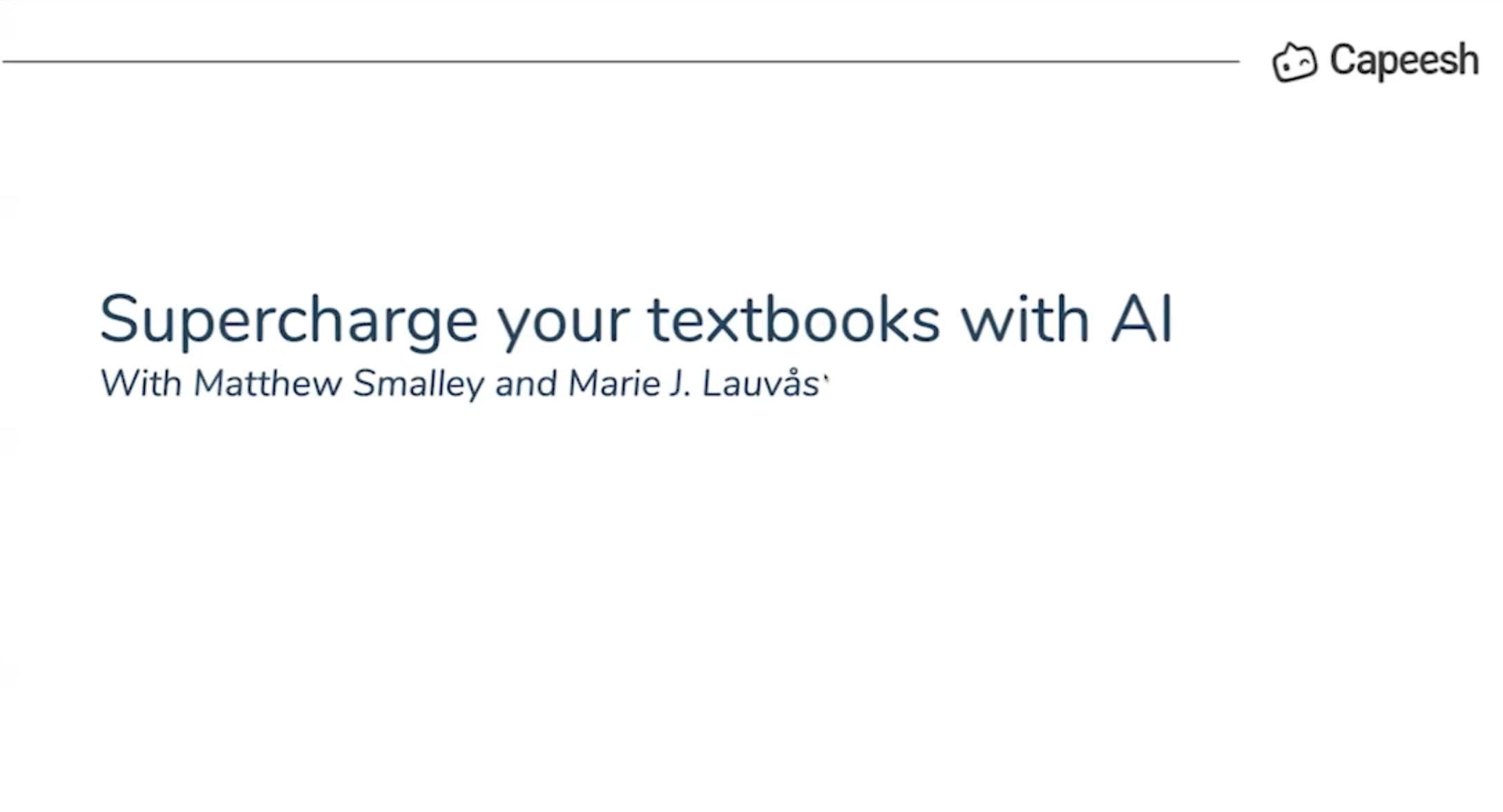 Presenters: Marie Jacobsen Lauvås, Co-founder and CEO, and Matthew Smalley, Co-founder and CPO, Capeesh Presenters: Marie Jacobsen Lauvås, Co-founder and CEO, and Matthew Smalley, Co-founder and CPO, Capeesh
AI tools are impacting many areas of higher education and textbook authors are curious to learn how these tools can enhance the learning experience of books. Matthew Smalley, Co-founder and CPO at Capeesh, and Marie Jacobsen Lauvås, Co-founder and CEO of Capeesh, share how novel authoring and publishing platforms allow authors to reap the benefits of the most advanced AI models while giving the author full control of the authoring and publishing process, and how these platforms are connected to an end-user interface that allows for the creation of rich, digital and game-based learning experiences in higher education and language learning, that learners love.

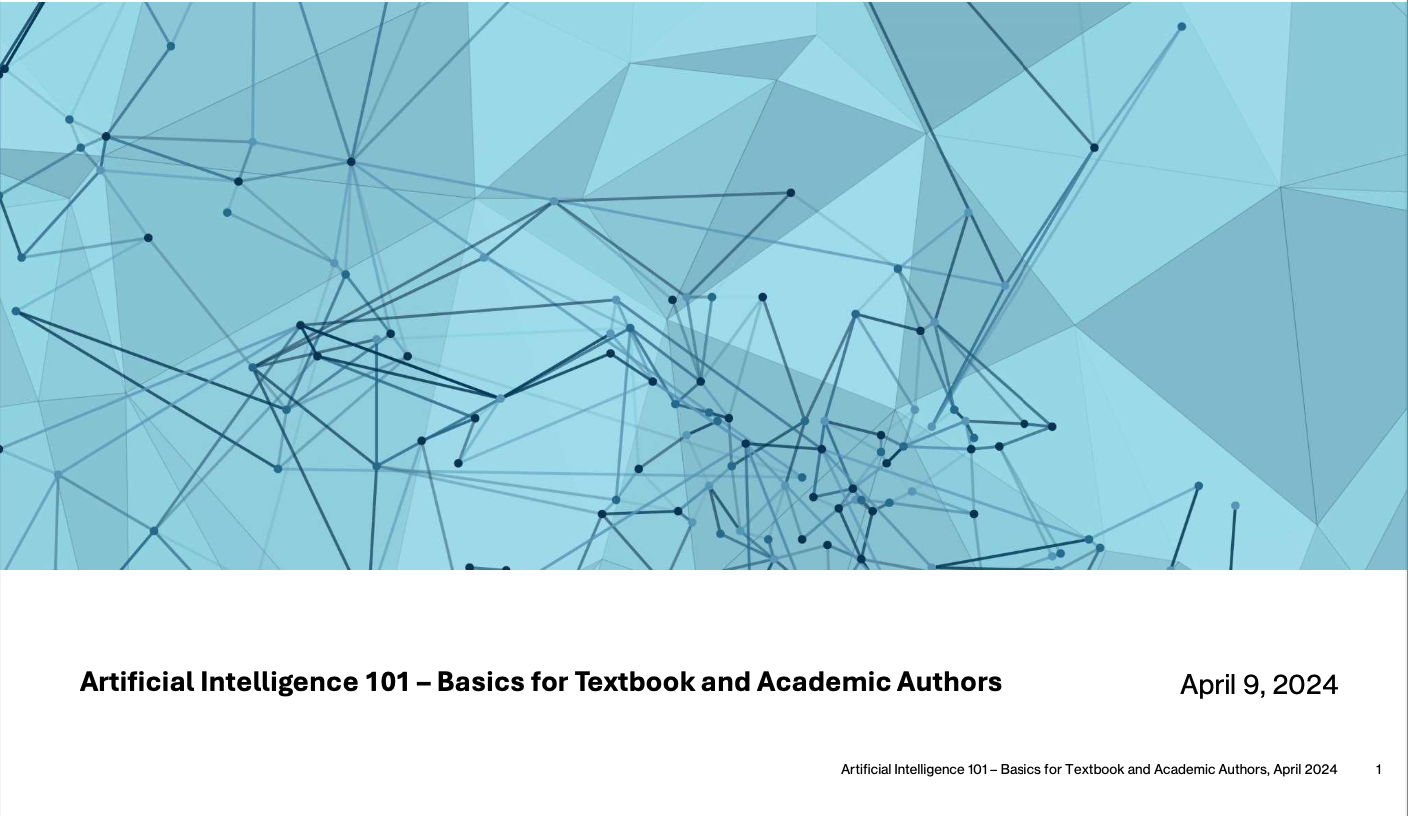 Presenter: Caitlin O’Brien, Director of Permissions, XanEdu Publishing Presenter: Caitlin O’Brien, Director of Permissions, XanEdu Publishing
AI is impacting many areas of higher education, and textbook and academic authors want to know more. Caitlin O’Brien, Director of Permissions for XanEdu Publishing, shares the basics of AI as it relates specifically to textbook and academic authors. O’Brien, an expert in this ever-changing field, provides an overview of AI, its capabilities and limitations, and what authors need to know to use these tools safely and ethically.
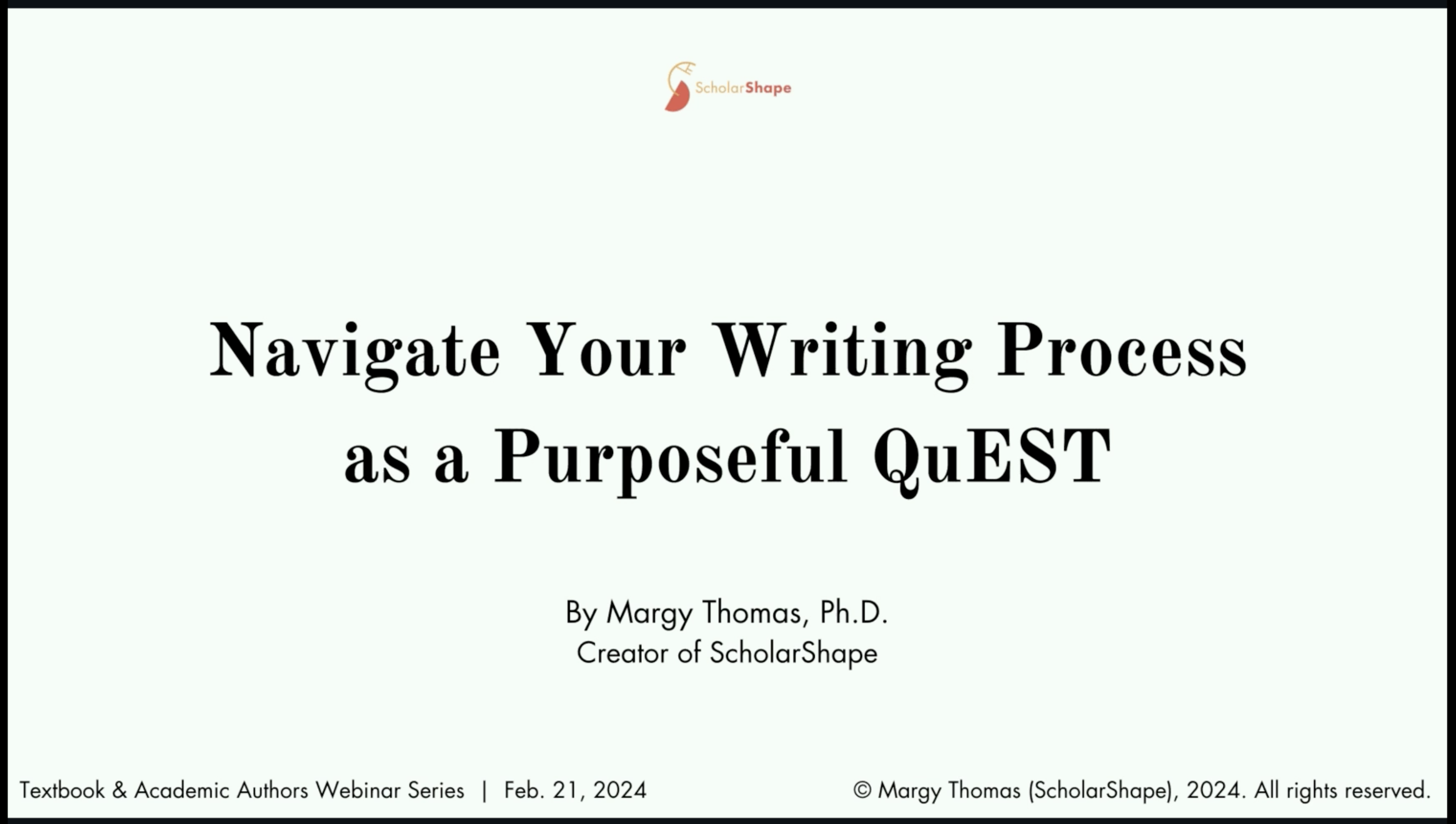 Presenter: Margy Thomas, PhD, ScholarShape Presenter: Margy Thomas, PhD, ScholarShape
Do you ever find yourself writing in circles, struggling with decision fatigue or a lack of purpose in your scholarly writing? Do you wish you had a structure for your writing process that felt expansive and flexible enough to account for the complexities of scholarship creation?
In this one-hour webinar, Margy Thomas, PhD, of ScholarShape walks you through the simple yet powerful QuEST framework as a way of structuring your writing projects in any genre. Through this framework, you’ll begin to see your own creative process as a Story-Argument, an experience of meaning-making amidst uncertainty, so that you can create powerful Story-Arguments for your readers. Get a personalized QuEST map that can guide you through your Story-Argument process with a sense of purpose and help you recognize all the intangible and incremental progress you make along the way.
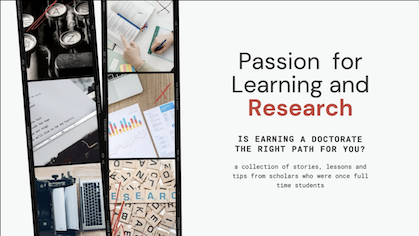 Presenters: Tasha Egalite, Ph.D., New Mexico State University; Kristin Kew, Ph.D., Associate Professor, Department of Educational Leadership and Administration, New Mexico State University Presenters: Tasha Egalite, Ph.D., New Mexico State University; Kristin Kew, Ph.D., Associate Professor, Department of Educational Leadership and Administration, New Mexico State University
In this presentation, two women scholars will share and reflect on their own doctoral journeys, the critical issues they encountered, and the hoops they jumped through while completing their dissertations. Some of the themes discovered during their research on the dissertation process and obtaining a doctorate were sustaining momentum, maintaining purpose, and creating meaningful works while furthering their learning in the fields of education and educational leadership. Learn how to determine whether to apply for a doctoral program and how to navigate some of the pitfalls and rabbit holes of the academic arena.
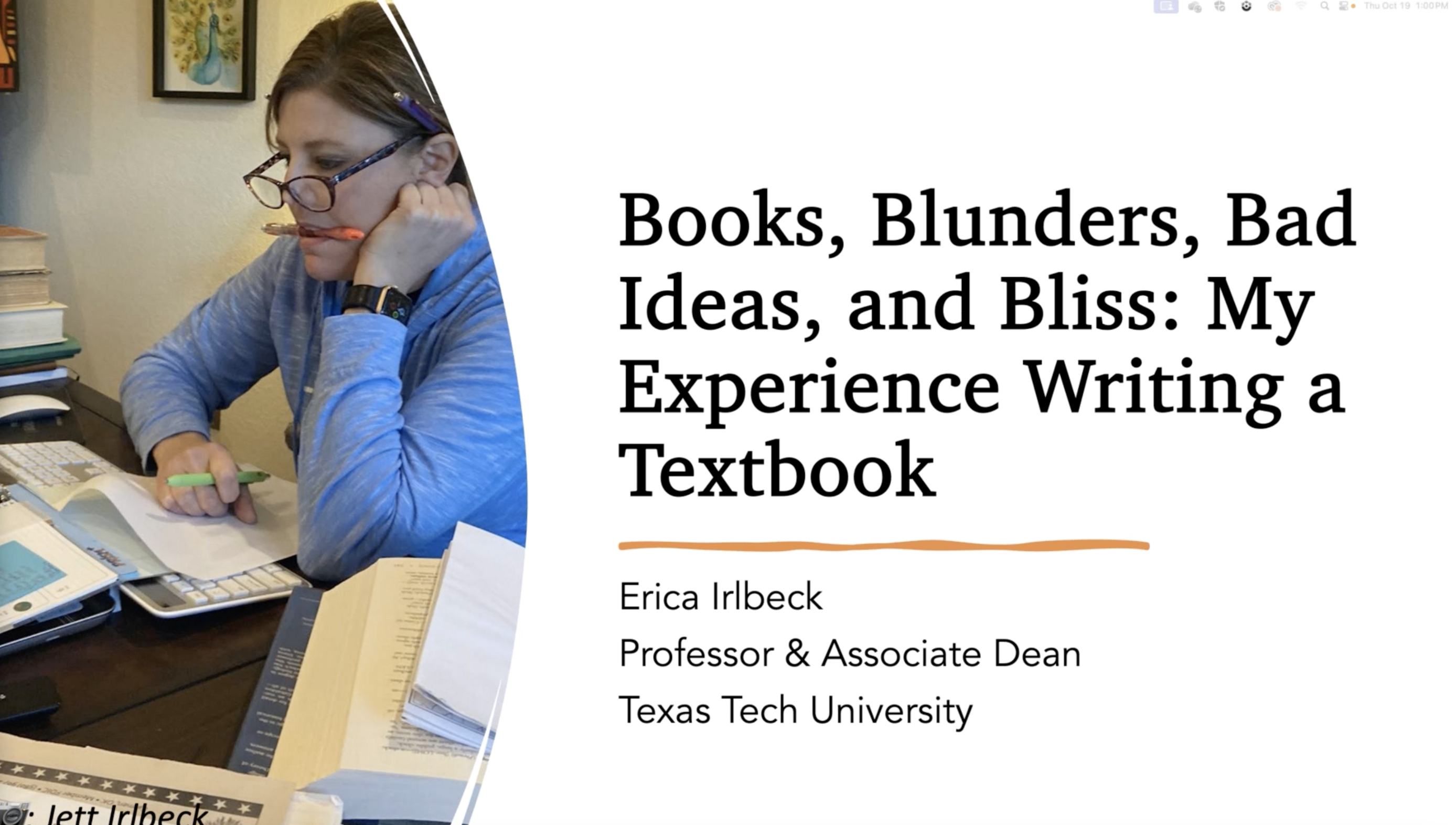 Presenter: Erica Irlbeck, author of The Crisis Communications Guide for Agriculture, Food & Natural Resources Presenter: Erica Irlbeck, author of The Crisis Communications Guide for Agriculture, Food & Natural Resources
Are you contemplating writing a textbook? It can be a daunting process but there are many success stories and opportunities to learn from colleagues who have recently published their content. Erica Irlbeck, Ed.D, Professor of Agricultural Education and Communications at Texas Tech and author of The Crisis Communication Guide for Agriculture, Food, and Natural Resources, share her journey in this engaging and interactive webinar. She is a passionate advocate for anyone contemplating writing their own content and will share what she learned through her own authoring journey. Joyce Mueller with XanEdu Publishing, a TAA Platinum Sponsor, also shares how you can author with XanEdu!
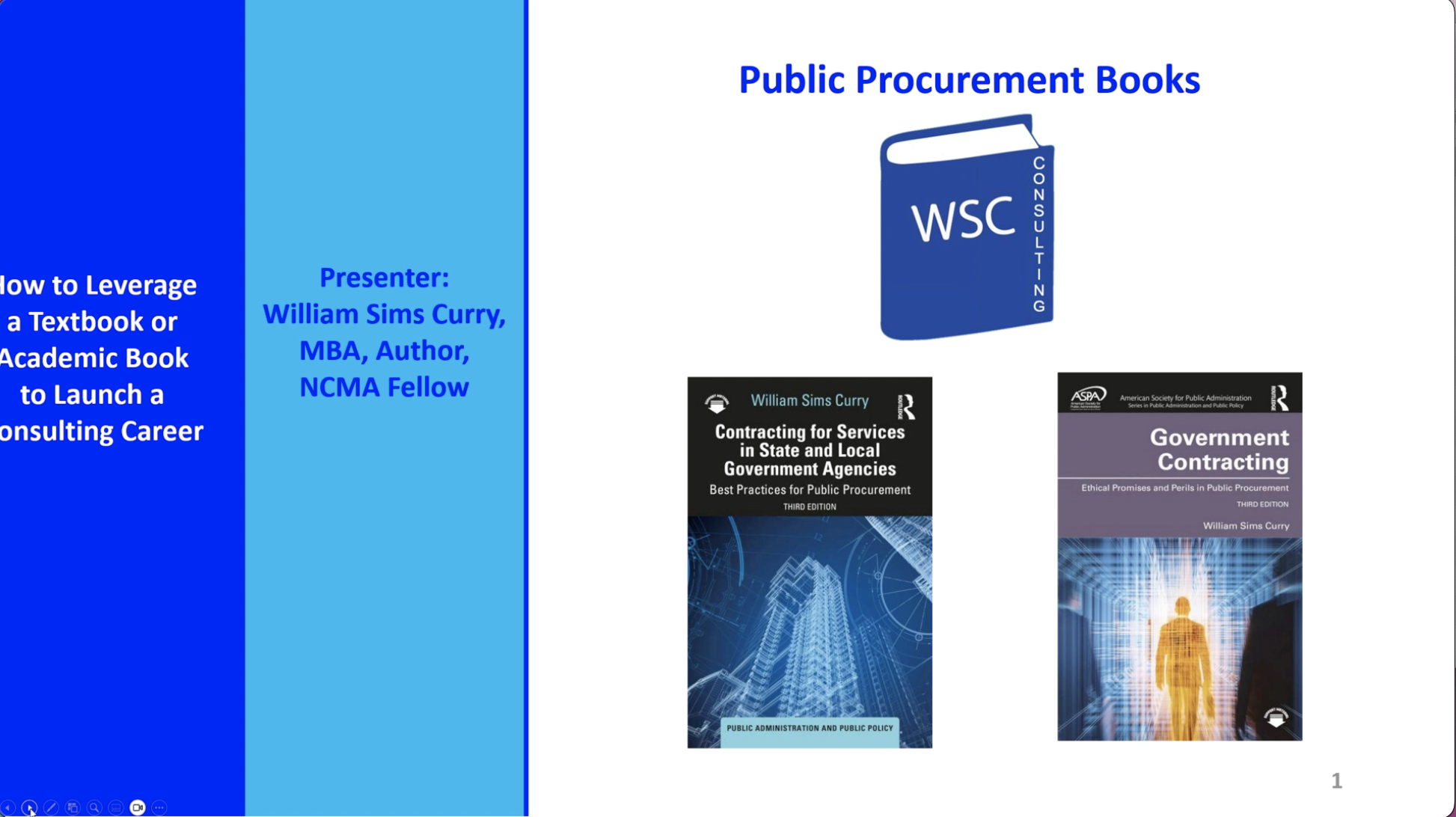 Presenter: William (Bill) Sims Curry, textbook author and Founder of WSC Consulting Presenter: William (Bill) Sims Curry, textbook author and Founder of WSC Consulting
Leveraging a textbook or academic book can be a powerful tool in launching a consulting career. Presenter William Curry, author of three public procurement textbooks, including Contracting for Services in State and Local Government Agencies: Best Practices for Public Procurement (winner of a 2017 Textbook Excellence Award), and founder of a consulting firm that specializes in consulting for state, local, and education entities that wish to implement best practices for public procurement, shares how you can use a textbook or academic book to position yourself as an expert in your field and attract potential clients.
You will learn how to:
- Establish a consultancy firm and land your first contract.
- Use your textbook or academic book as a marketing tool to help differentiate you from other consultants while showcasing your expertise to a wider audience.
- Promote your consulting firm and sell your books through a dual-purpose website.
- Join or expand your presence on LinkedIn to increase the number of potential clients and promote your book(s) and consultancy.
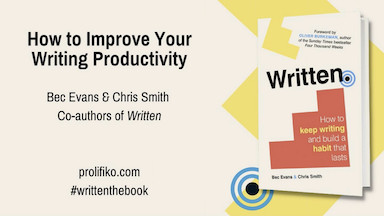 Presenters: Bec Evans and Chris Smith, founders of Prolifiko and co-authors of Written: How to Keep Writing and Build a Habit that Lasts Presenters: Bec Evans and Chris Smith, founders of Prolifiko and co-authors of Written: How to Keep Writing and Build a Habit that Lasts
You’ve got the ideas. You’ve found the right collaborators. You have the best tools at hand. So why aren’t you writing? Or at least – writing as much as you think you should?
Writing involves two elements: technique and practice. To write, you need to understand how to structure a paper, compile a dataset and organise your references. Whatever your field, there will be certain technical and structural things that you need to know. All crucial knowledge. But sometimes you still sit in front of your computer and struggle to complete the task at hand. You need more than to know how. Knowing how is important, but that alone won’t get the writing done. You’ll also need to find a practice that means you turn up and keep going.
Using practices developed from neuroscience and behavioural science research, this webinar covers:
- What stops you writing: procrastination, perfectionism, distraction and building a plan to overcome them
- What keeps you going: finding time, creating a habit, building support and finding accountability
Watch
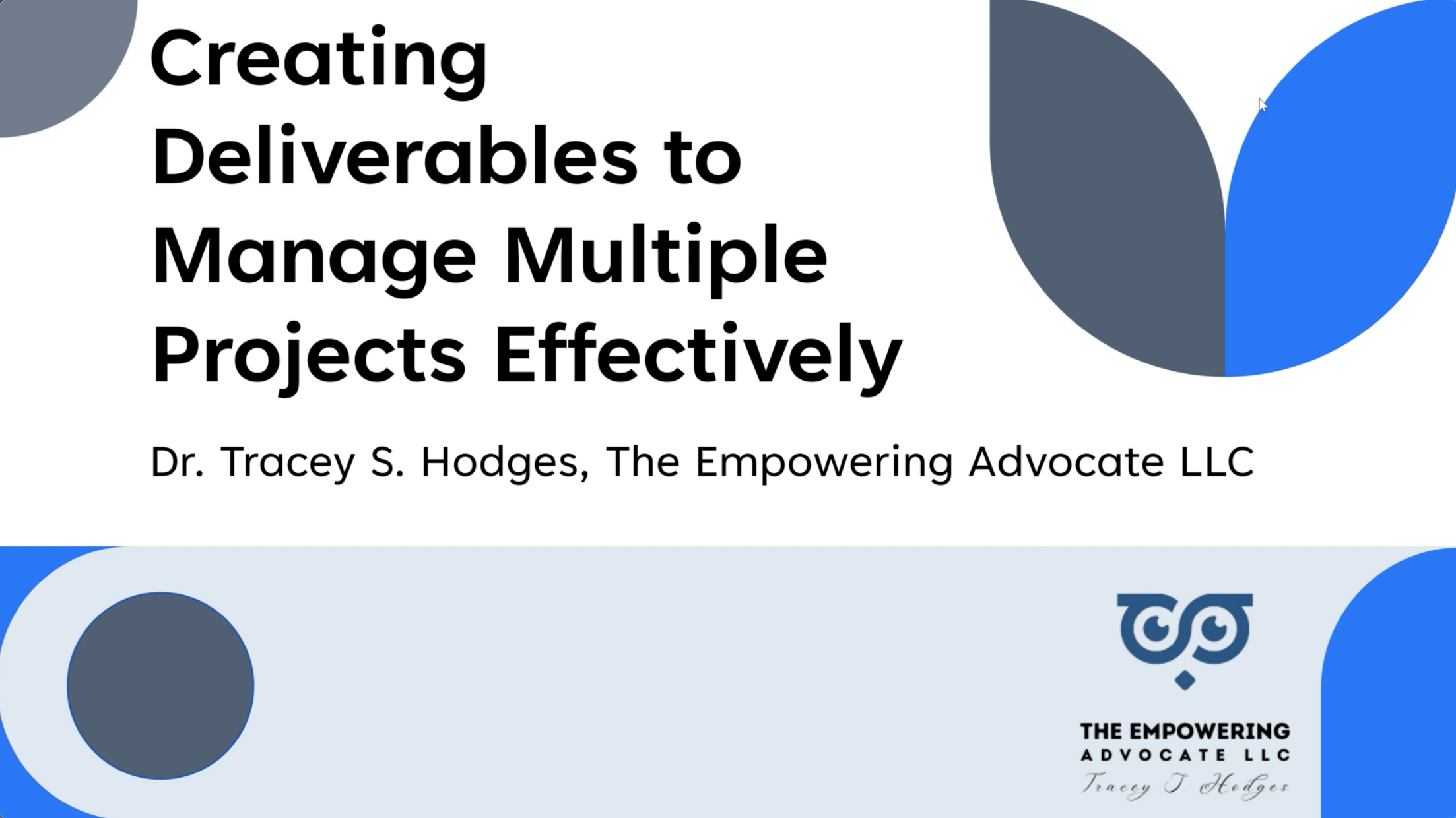 Presenter: Dr. Tracey S. Hodges, Owner and Chief Creative Officer, The Empowering Advocate LLC Presenter: Dr. Tracey S. Hodges, Owner and Chief Creative Officer, The Empowering Advocate LLC
UPS, Fedex, the post office, and even Amazon are exceptional at deliverables. Have you ever imagined you could be just as effective with your goals and projects? Are you tackling several projects and finding yourself getting lost among the tasks? Learn how to create clear deliverables for your project as well as systems to help you make progress on multiple projects at the same time. Like the delivery systems we know so well, thorny issues are bound to come up, and we will tackle some options for managing overwhelm, too. Gain a sense of purpose and attainable goals! Watch
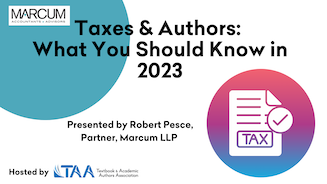 Presenter: Robert M. Pesce, Partner, Marcum LLP Presenter: Robert M. Pesce, Partner, Marcum LLP
While it is understandable that most writers would prefer to concentrate their time on their writing, writing is a business and you need to make sure you’re taking care of all of the tax deductions that you should be. Robert M. Pesce, a partner with Marcum LLP, shares the basic tax information you should know as an author, including:
- What type of entity should you be?
- Are you keeping good records on your business deductions?
- Income from Royalties and other sources
- Qualified Business Income Deduction
- Tax deductions
- Home Office Deduction
- Self Employment Tax (“SE Tax”)
- Pension Plans, SEPs, IRAs
- Foreign Tax Credit
Watch
Presenter: John Bond, Publishing Consultant, Riverwinds Consulting, author of The Little Guide to Getting Your Journal Article Published: Simple Steps to Success
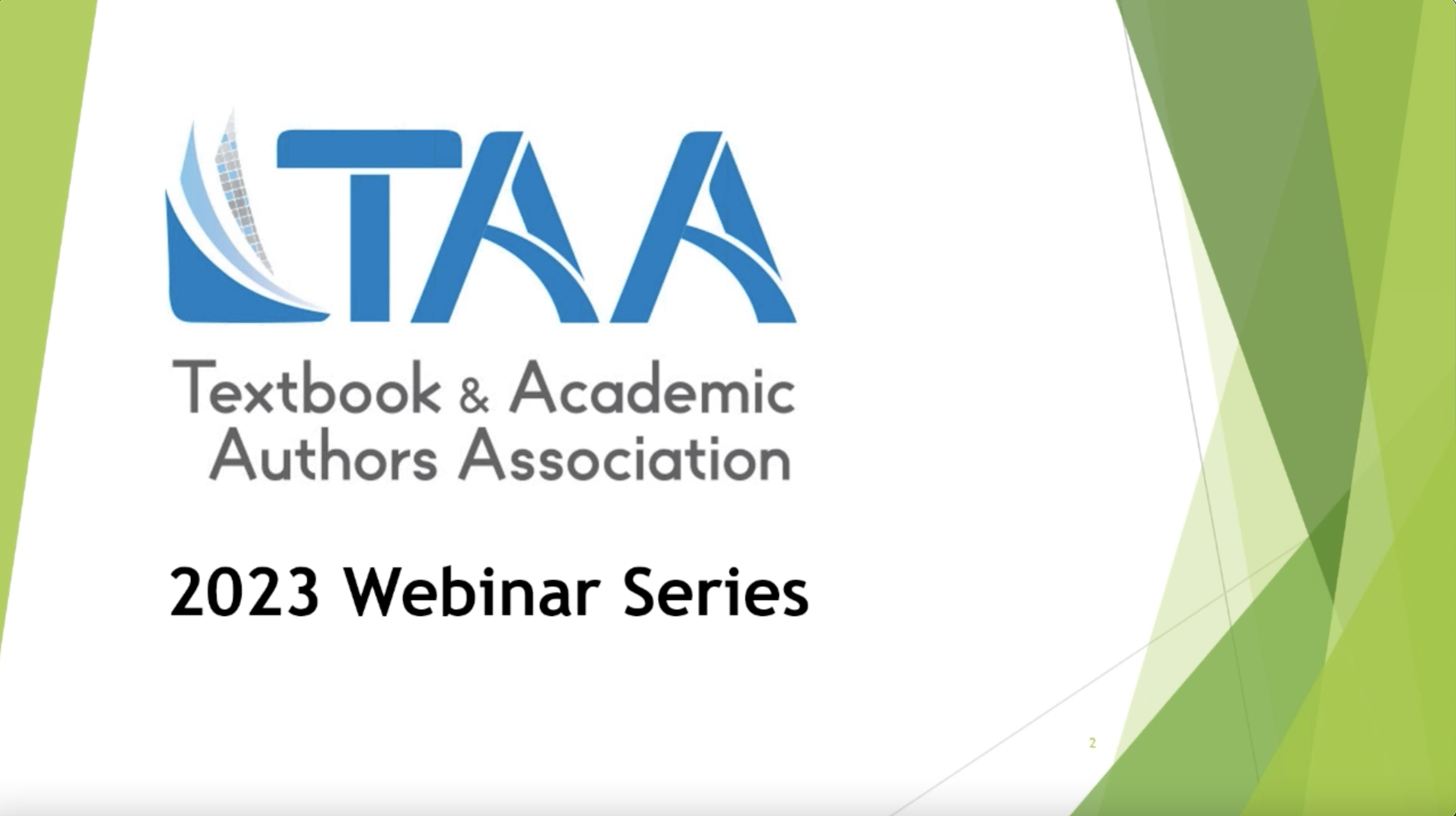
Getting your research and academic work published in a peer review journal is essential to your career. The process seems difficult and mysterious, but it doesn't need to be that way.
Publishing Consultant John Bond presents practical steps for any aspiring writer and researcher to follow to go from idea and raw data to submitting a top quality manuscript for possible publication. Topics include: "Developing a plan and Timeline," "Determining a Target List of Potential Journals," "Writing and Editing Your Work," and "Understanding Journal Review the Decision Process." You'll also learn the 13 most Frequently Asked Questions. Watch
Presenters: Eirik Wahlstrøm, Co-founder and CMO, Ludenso; Rob Heathcote, PG Online Publishers; and Biology Teacher Sarah Dudley
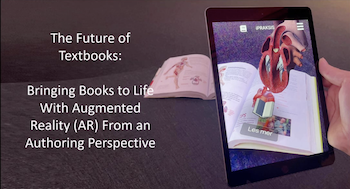
Augmented reality (AR) in education provides a number of ways to help students learn by making abstract concepts easier to understand and remember. Today, an increasing number of publishing houses are starting to bring their books to life with AR - but how do you as an author utilize the full potential of this immersive learning experience in a simple, pedagogically valuable, and affordable way?
Eirik Wahlstrøm from Ludenso, Rob Heathcote from PG Online Publishers, and Biology Teacher Sarah Dudley discuss the potential role of AR in the authoring process of science, anatomy, history, and language learning titles. Learn best practices for creating AR books, practical advice, and tools, as well as share feedback from students using AR to learn. Watch
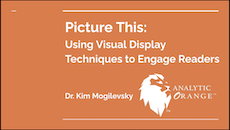 Presenter: Dr. Kim Mogilevsky, founding member and CEO, Analytic Orange Presenter: Dr. Kim Mogilevsky, founding member and CEO, Analytic Orange
The old English idiom 'A picture is worth a thousand words' is something that many people can agree with. However, data-journalist and information designer David McCandless argued that while a picture has the potential to tell a story, a good "picture" has four elements: information, function, visual form, and a story. If one or more of those elements are missing, the visualization is not as helpful or interesting. In this one hour webinar by Kim Mogilevsky, founding member and CEO of Analytic Orange, academic authors can gain insight into how visual-display techniques impact a reader's perception and cognition of information and explore several ways to create and display data in exciting, interesting, and engaging formats. Watch
Presenter: Jamie Pope, Co-author of Nutrition for a Changing World (2e), the recipient of a 2020 TAA Textbook Excellence Award
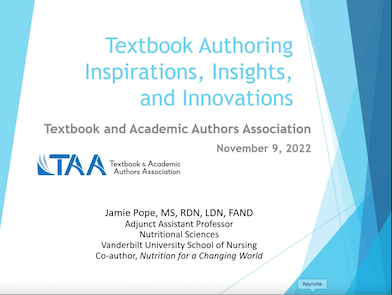 In this one-hour webinar, award-winning nutrition textbook author Jamie Pope shares her journey to published textbook author and beyond and insights into the textbook writing process, including: In this one-hour webinar, award-winning nutrition textbook author Jamie Pope shares her journey to published textbook author and beyond and insights into the textbook writing process, including:
- How writing a textbook differs from writing trade book
- Why you might want to consider writing a textbook
- What background and experience you need to get the attention of a publisher
- How to decide whether to write an introductory or upper-level textbook
- How to negotiate an author-friendly contract
- How to decide between writing as a solo author or bringing in a coauthor
- How to be innovative so that you stand out in the market
- Why it’s important to get involved in promotion and marketing
Watch
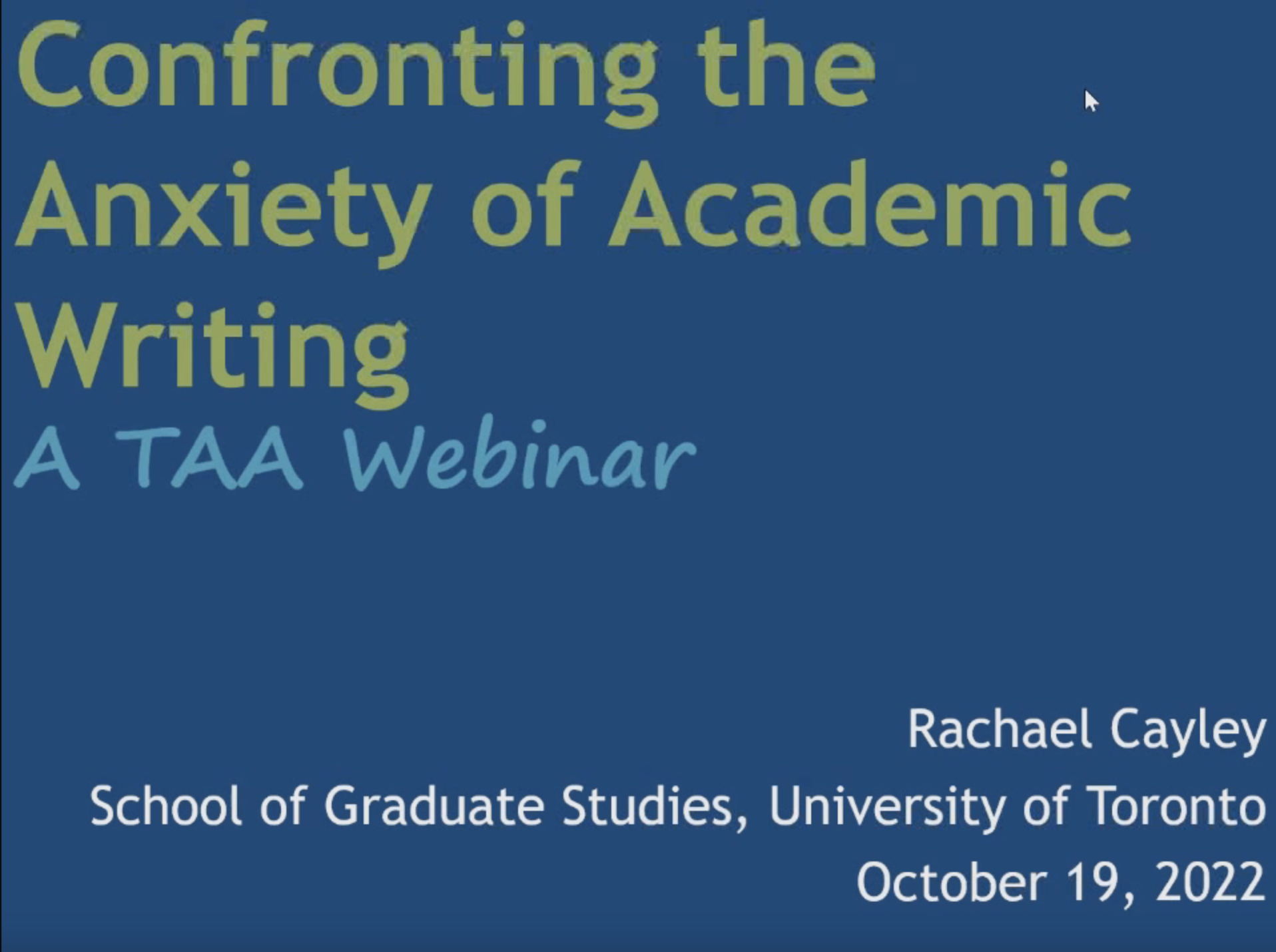 Presenter: Rachael Cayley, Associate Professor (teaching stream), Graduate Centre for Academic Communication, School of Graduate Studies, University of Toronto Presenter: Rachael Cayley, Associate Professor (teaching stream), Graduate Centre for Academic Communication, School of Graduate Studies, University of Toronto
Becoming an effective academic writer is one of the key challenges facing doctoral students and early career researchers. Despite the centrality of writing, few writers feel comfortable with the process or confident about their product. After examining some of the reasons for this anxiety, we’ll ask if we can lessen the psychic toll by acknowledging the profound intellectual challenges and tackling the persistent practical obstacles. Watch
Presenter: Mary Beth Averill, academic writing coach, editor, and author of The Confident Academic: Overcoming the small fish, big pond experience… and other difficult matters
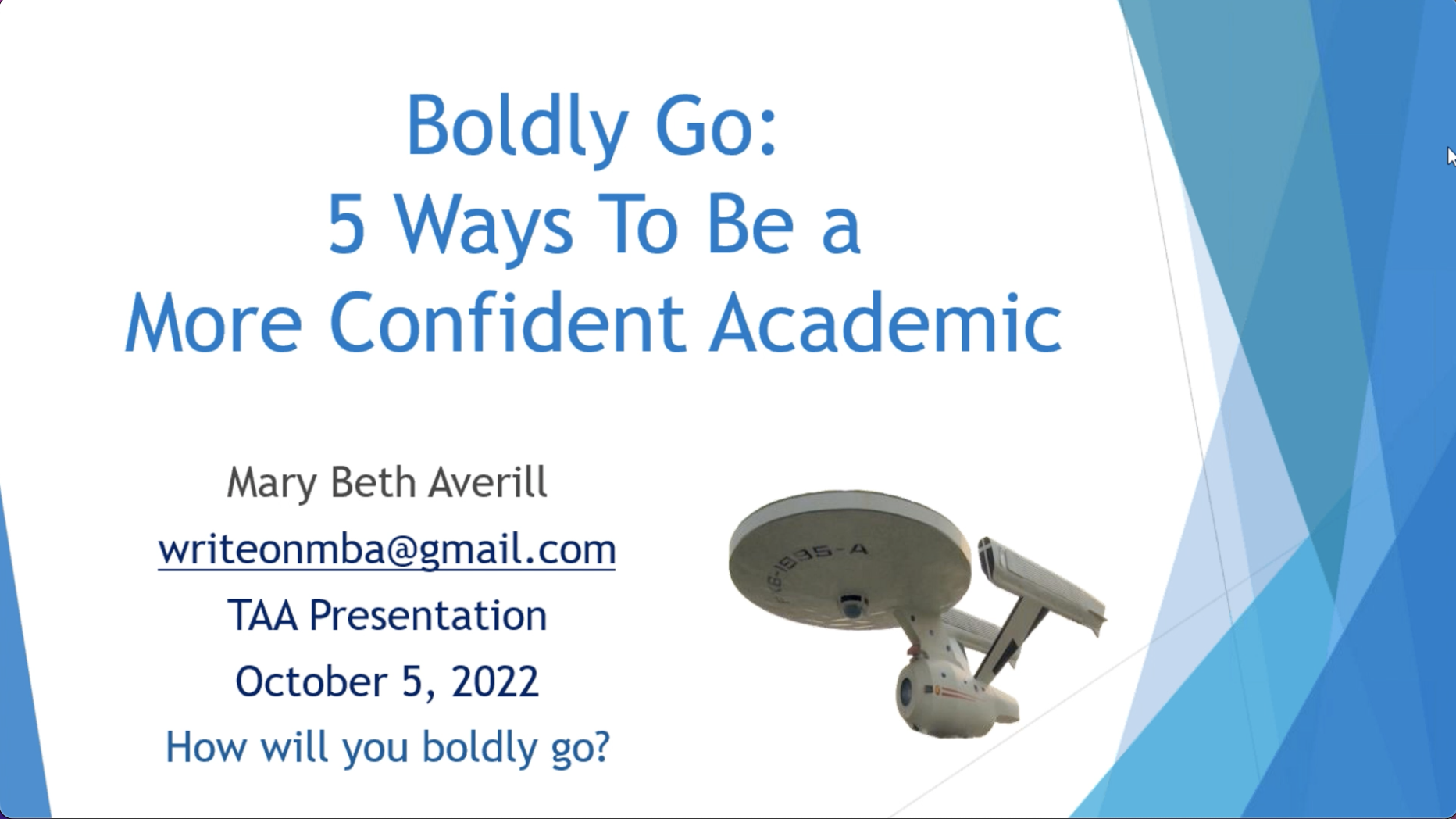 Many academics lack confidence in some aspect of their professional lives. Some are open about this; for others, it’s a well-kept secret. In this one-hour webinar by Academic Writing Coach, Editor and Author Mary Beth Averill, she briefly surveys some of the reasons academics lack confidence and shares 5 ways you can increase your confidence as an academic. Watch Many academics lack confidence in some aspect of their professional lives. Some are open about this; for others, it’s a well-kept secret. In this one-hour webinar by Academic Writing Coach, Editor and Author Mary Beth Averill, she briefly surveys some of the reasons academics lack confidence and shares 5 ways you can increase your confidence as an academic. Watch
Presenters: Nigel A. Caplan, PhD, Associate Professor and Manager, Graduate Programs and Online Learning, University of Delaware English Language Institute; and Ann M. Johns, PhD, Professor Emerita, Linguistics and Writing Studies, San Diego State University
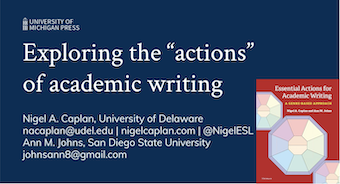 Nigel Caplan and Ann Johns, authors of Essential Actions for Academic Writing (University of Michigan Press), introduce a genre-based approach to writing and writing instruction. By understanding the components of genre, writers can tackle new and challenging tasks, an approach which also works well for teaching undergraduate and graduate students. The presenters demonstrated how to analyze the genre of the research article and identify the "actions" that writers take in each section (introduction, methods, results, and discussion). In order to effectively pursue these actions, writers need to understand both the rhetorical moves that are expected, conventional, or available and the language typical of each stage. Get resources and tips for successful academic writing in any genre and any discipline. Watch Nigel Caplan and Ann Johns, authors of Essential Actions for Academic Writing (University of Michigan Press), introduce a genre-based approach to writing and writing instruction. By understanding the components of genre, writers can tackle new and challenging tasks, an approach which also works well for teaching undergraduate and graduate students. The presenters demonstrated how to analyze the genre of the research article and identify the "actions" that writers take in each section (introduction, methods, results, and discussion). In order to effectively pursue these actions, writers need to understand both the rhetorical moves that are expected, conventional, or available and the language typical of each stage. Get resources and tips for successful academic writing in any genre and any discipline. Watch
Presenter: Michelle Boyd, PhD, Writer, Scholar, Founder, InkWell Academic Writing Retreats
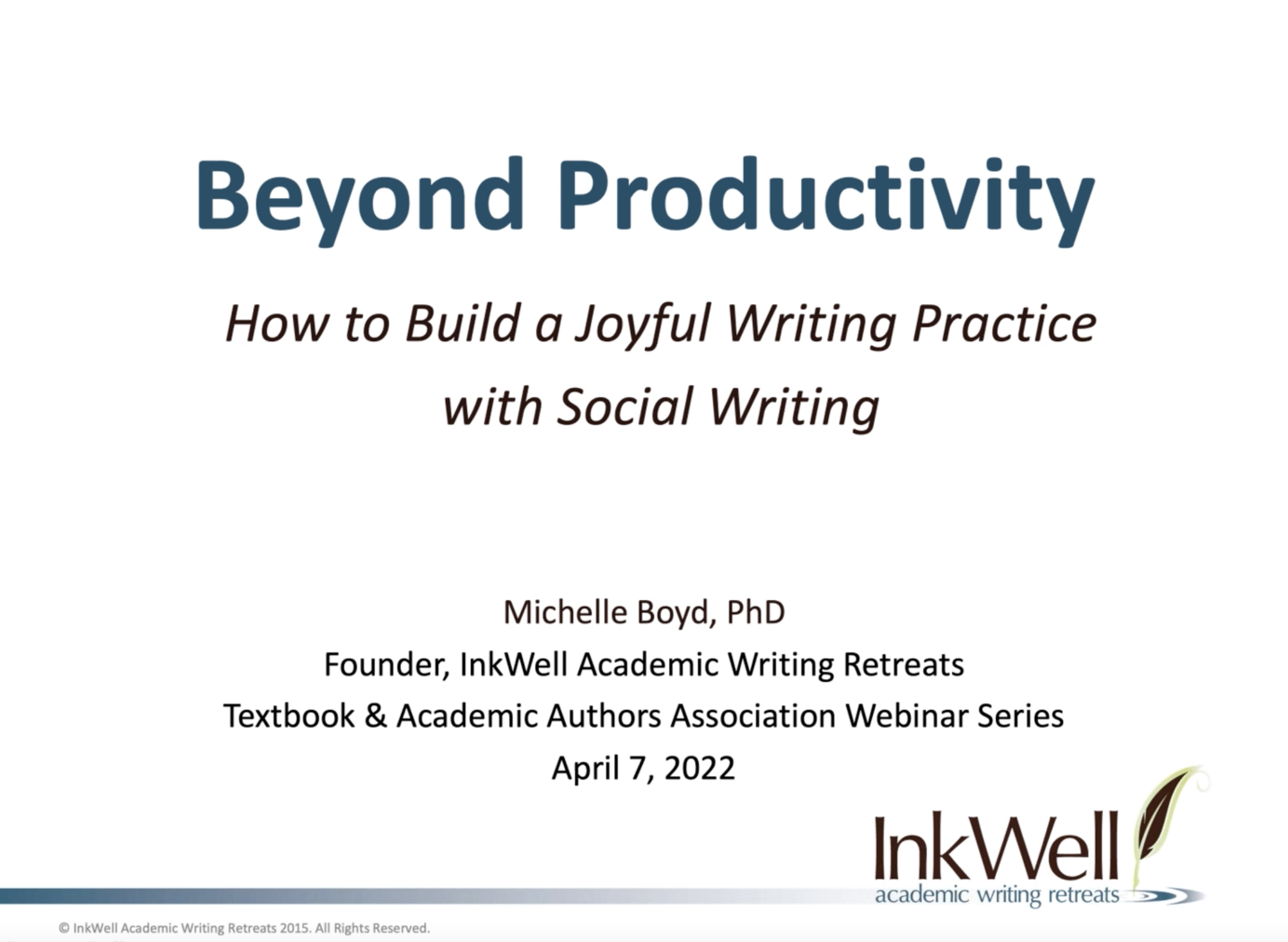
Are you tired of feeling anxious, overwhelmed, or unconfident as a writer? Do you long to recover your love of inquiry and cultivate a joyful relationship with your writing?
In this one hour webinar, Michelle Boyd of InkWell Academic Writing Retreats explains why writing is so emotionally taxing and how scholars can use social writing to overcome their writing fears. By the end of the session, you will better understand your own barriers and have a step-by-step plan for implementing your personalized social writing strategy. Watch
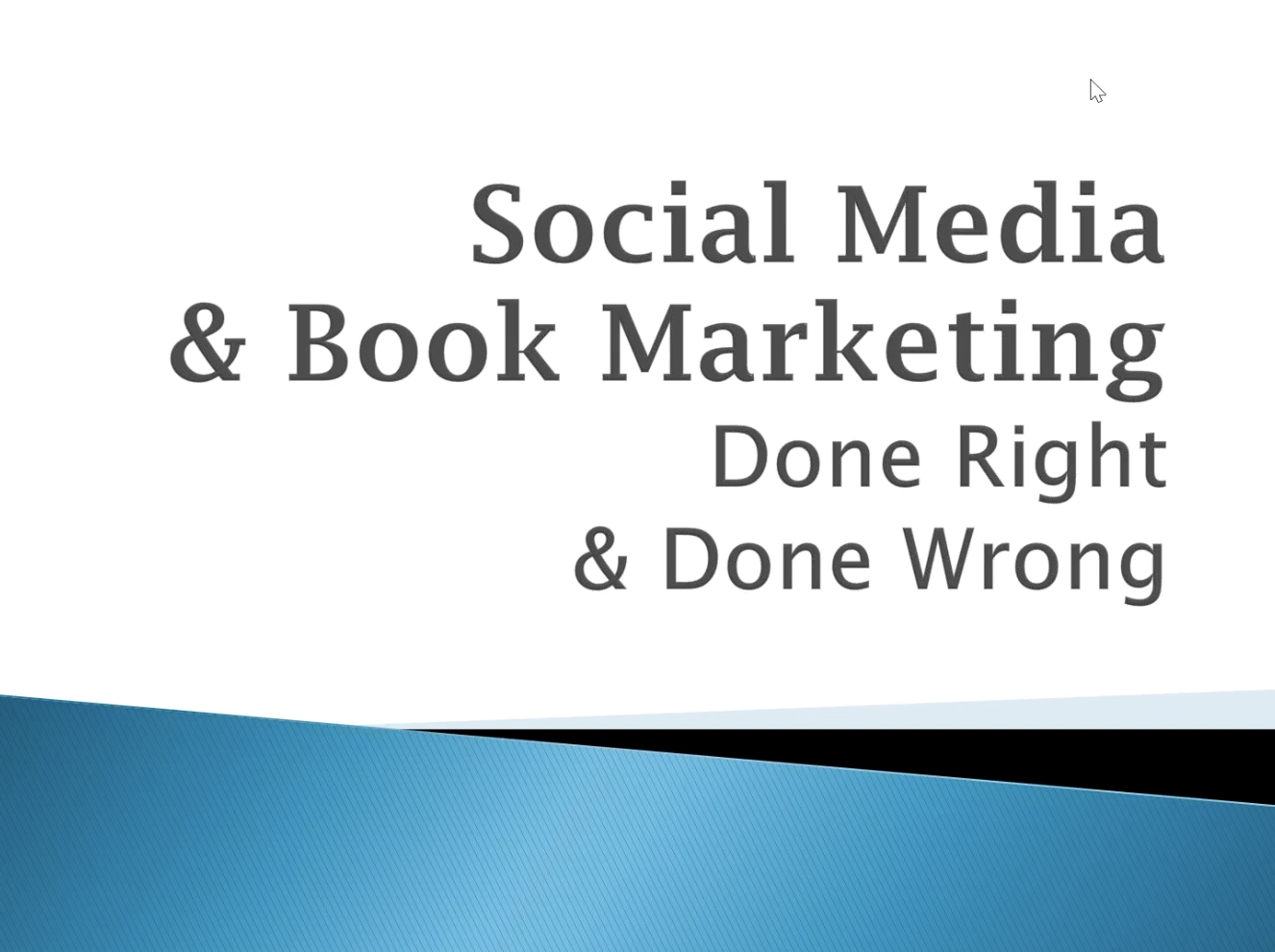 Presenter: John Bond, Publishing Consultant, Riverwinds Consulting Presenter: John Bond, Publishing Consultant, Riverwinds Consulting
Publishers want authors to participate in the marketing and promotion of their new book. But many times authors are novices in publicizing their work. Publishing Consultant John Bond examines author marketing and social media efforts done right and done wrong. He also looks at best practices for promoting your book, as well as explaining why some efforts are time consuming and produce little results. Real life examples will illustrate how authors can smartly and efficiently work with the publisher to market their work; social media included. Watch
Presenter: Lisa Fedorak, Owner and Indexer, Fedorak Indexing Services
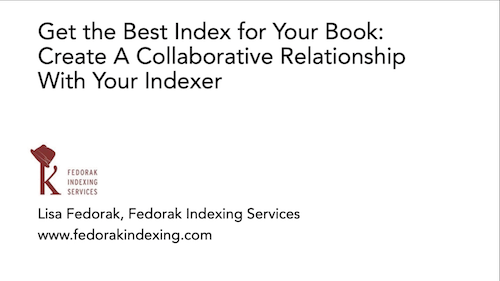 You’ve been working long and hard on your book and now you need to get an index for your book. Should you index it yourself, let your publisher take care of it, or hire someone yourself? And if it’s the latter, how do you go about getting a great index for your book when you’ve never gone through this process before and don’t know anything about it? This one-hour webinar presented by indexer Lisa Fedorak guides you through a collaborative relationship between author and indexer and give you information that can help you get the best index for your book. It covers when to start looking for an indexer, how to find and evaluate an indexer, things to discuss with your indexer at the start of the indexing process, what to expect during the process and dealing with revisions to the index. Watch You’ve been working long and hard on your book and now you need to get an index for your book. Should you index it yourself, let your publisher take care of it, or hire someone yourself? And if it’s the latter, how do you go about getting a great index for your book when you’ve never gone through this process before and don’t know anything about it? This one-hour webinar presented by indexer Lisa Fedorak guides you through a collaborative relationship between author and indexer and give you information that can help you get the best index for your book. It covers when to start looking for an indexer, how to find and evaluate an indexer, things to discuss with your indexer at the start of the indexing process, what to expect during the process and dealing with revisions to the index. Watch
Presenter: Sean Wakely, Vice President of Product and Editorial, FlatWorld
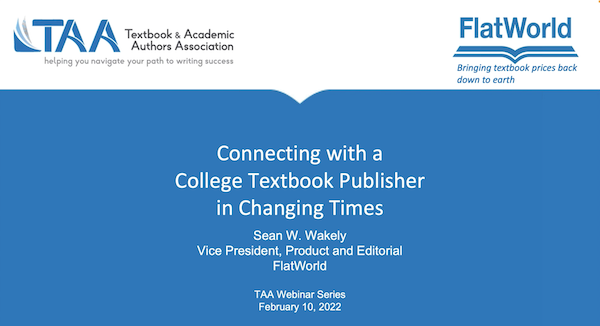 College textbook publishing has changed in many significant ways over the past twenty years. While the industry is still dominated by a small number of large publishers, their product and business models have evolved greatly. Pressure to create a variety of low-priced product options and resulting decreases in growth and profit have caused many publishers to pull back on the acquisition of new products. Consequently, acquisitions editors have often begun to focus on managing existing titles rather than on acquiring new products. If you are flexible, persistent, and creative, you can still find opportunities to write or contribute to a college-level textbook. Sean describes the current college textbook publishing landscape and provides you with actionable ideas about how to approach and form a relationship with the editorial staff who are responsible for bringing new writing talent into a publisher. Watch College textbook publishing has changed in many significant ways over the past twenty years. While the industry is still dominated by a small number of large publishers, their product and business models have evolved greatly. Pressure to create a variety of low-priced product options and resulting decreases in growth and profit have caused many publishers to pull back on the acquisition of new products. Consequently, acquisitions editors have often begun to focus on managing existing titles rather than on acquiring new products. If you are flexible, persistent, and creative, you can still find opportunities to write or contribute to a college-level textbook. Sean describes the current college textbook publishing landscape and provides you with actionable ideas about how to approach and form a relationship with the editorial staff who are responsible for bringing new writing talent into a publisher. Watch
Presenter: Juli Saitz, CPA, Senior Managing Director, Ankura Consulting Group
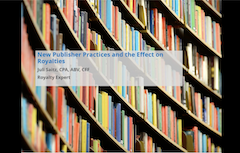 Are you increasingly confused by the contents of your royalty statements? Do you wonder why the statements get longer but your checks are getting smaller? Juli Saitz, Royalty Expert and CPA has seen the shift in royalty reporting practices and reporting from all of the top higher education publishers. In this webinar she discusses how publishers are currently marketing textbooks and other electronic materials and provides a roadmap for evaluating your royalties and knowing what questions to ask of your publisher. In addition, she addresses the context of publishing agreements and the importance of reading the “fine print.” Watch Are you increasingly confused by the contents of your royalty statements? Do you wonder why the statements get longer but your checks are getting smaller? Juli Saitz, Royalty Expert and CPA has seen the shift in royalty reporting practices and reporting from all of the top higher education publishers. In this webinar she discusses how publishers are currently marketing textbooks and other electronic materials and provides a roadmap for evaluating your royalties and knowing what questions to ask of your publisher. In addition, she addresses the context of publishing agreements and the importance of reading the “fine print.” Watch
Presenter: Erica Machulak, PhD, Founder, Hikma Strategies
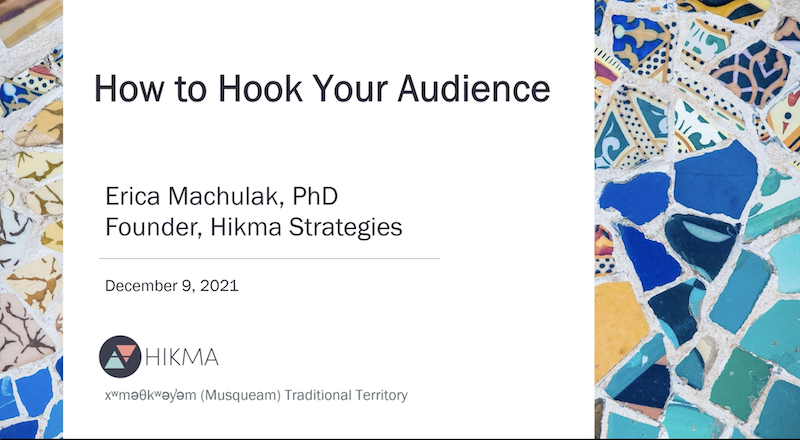 In the era of “fake news,” it is critical that research be translated and published as widely and accurately as possible. Among many journalists, however, academics are notorious for their caveats, sub-clauses, and unwillingness to tell a good story. Research experts often find it challenging to engage non-specialist audiences in ways that preserve the rigor and credibility of their work. In the era of “fake news,” it is critical that research be translated and published as widely and accurately as possible. Among many journalists, however, academics are notorious for their caveats, sub-clauses, and unwillingness to tell a good story. Research experts often find it challenging to engage non-specialist audiences in ways that preserve the rigor and credibility of their work.
This one-hour webinar presented by Erica Machulak, PhD., founder of Hikma Strategies, offers a framework and actionable strategies to write research narratives that inform and engage non-specialist audiences. It focuses specifically on how to develop a brief, effective research summary tailored for a target audience beyond your field who may or may not have a research background. She explores how to create common ground, prioritize key points, preserve credibility, and invite curiosity. The principles discussed in this webinar can be applied to a wide range of genres such as op-eds, educational case studies, and summaries for funding proposals. Watch
Presenter: Paul A. Krieger, author of Visual Analogy Guides
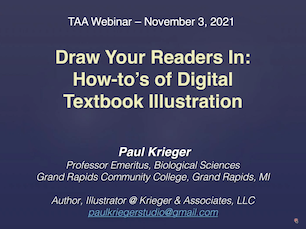 Have you ever wondered how digital illustrations for textbooks are created? Paul Krieger, an author and illustrator, demonstrates the process of how he uses a Wacom tablet and Adobe Illustrator software to create original illustrations for his books. He also designs his own book covers and offers tips for creating more appealing and effective book covers. In addition, he shows authors how they can easily start a handy digital sketchbook using an iPad, an Apple Pencil, and an inexpensive app called Procreate. Whether you are simply curious or want to try your hand at illustration, join Paul to see how digital illustration is done. Watch Have you ever wondered how digital illustrations for textbooks are created? Paul Krieger, an author and illustrator, demonstrates the process of how he uses a Wacom tablet and Adobe Illustrator software to create original illustrations for his books. He also designs his own book covers and offers tips for creating more appealing and effective book covers. In addition, he shows authors how they can easily start a handy digital sketchbook using an iPad, an Apple Pencil, and an inexpensive app called Procreate. Whether you are simply curious or want to try your hand at illustration, join Paul to see how digital illustration is done. Watch
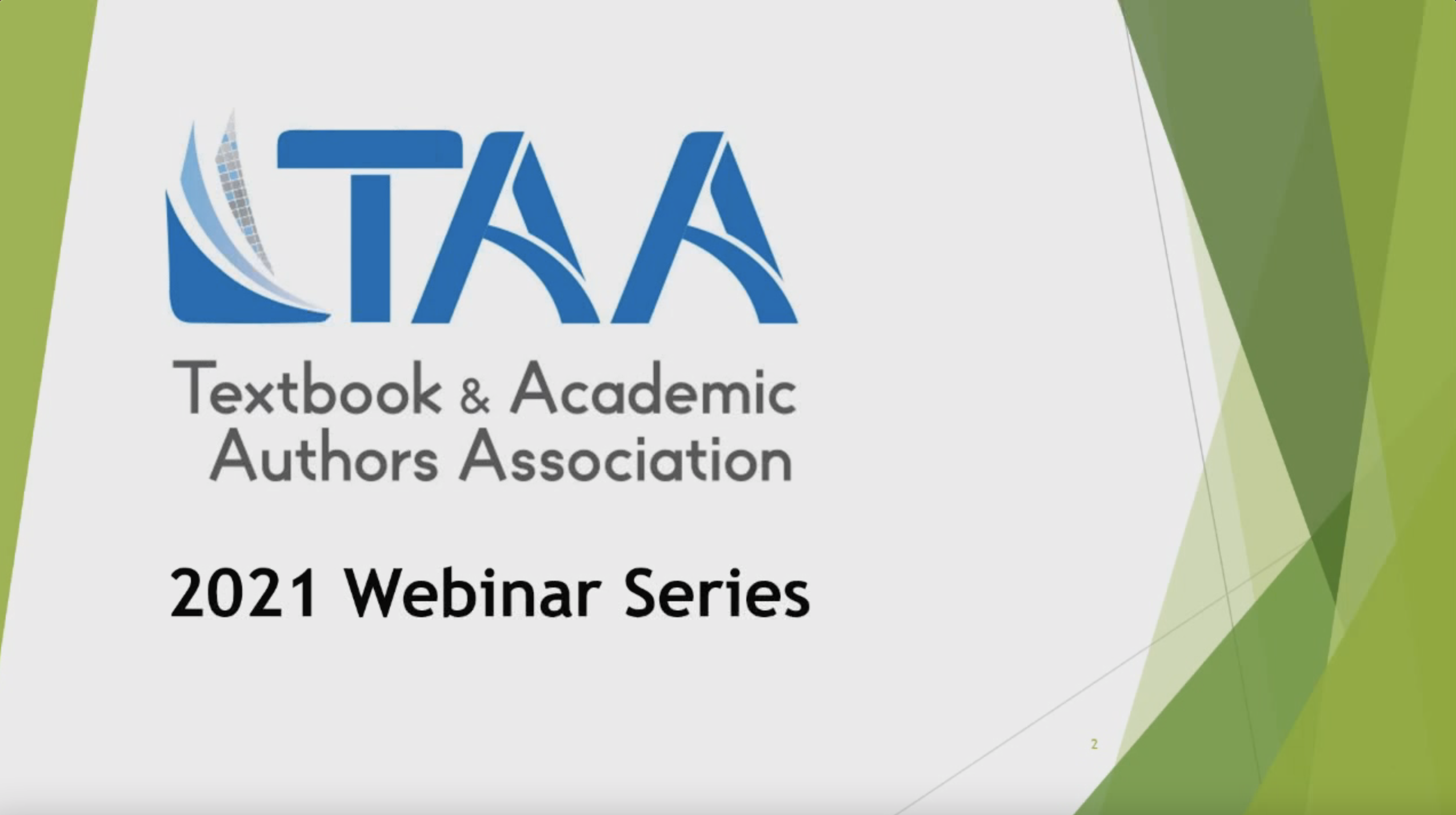 Presenter: John Bond, Publishing Consultant, Riverwinds Consulting Presenter: John Bond, Publishing Consultant, Riverwinds Consulting
The Query Letter and Book Proposal are the go-to means of communicating an author's ideas to prospective publishers. But how do publishers assess Book Proposals? When they read a Query Letter, how do they evaluate the idea, the author, and the market? Publishing Consultant John Bond examines these common author documents and then uses a publisher's magnifying glass to look at them through their eyes. By reviewing Query Letters and Book Proposals for the publisher's wants, the author will be better equipped to create more attractive projects that will secure greater attention and possible publishing contracts. John shares best practices for creating these documents as well as the do's and don'ts. Watch
|